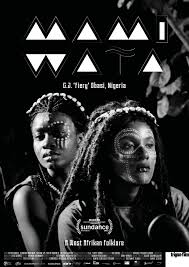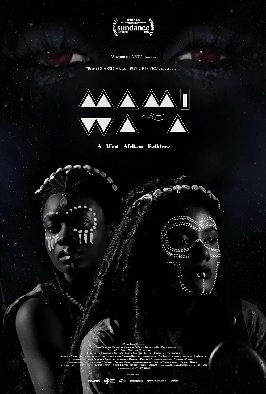
Mami Wata is a Nigerian film directed by C.J. “Fiery” Obasi that stands as a bold and creative exploration of African mythology intertwined with contemporary themes. The film showcases a unique narrative that blends the mystical with the real, set in the fictional village of Iyi. The film garnered significant attention even before its Nigerian release, having premiered internationally at the Sundance Film Festival, where it received praise for its distinctive style and captivating storytelling.
At the heart of the film is the legend of Mami Wata, the revered mermaid goddess worshiped by the villagers. The peaceful community’s long-standing belief in Mami Wata faces a serious challenge when a mysterious illness begins to spread, coupled with the looming threat of war. As the villagers’ faith in their goddess is shaken, the film explores themes of belief, identity, and the tension between tradition and modernity.
One of the most striking aspects of Mami Wata is its black-and-white cinematography, a deliberate choice that sets it apart from conventional Nollywood productions. This visual style heightens the film’s ethereal atmosphere, creating an almost dreamlike quality that complements its fantastical narrative. The decision to shoot the film in black and white is both an artistic and symbolic choice, enhancing the film’s focus on the contrast between light and dark, the spiritual and the material, and the timeless and the contemporary.
The film’s story unfolds as the villagers grapple with the challenges that arise from the illness and the societal unrest caused by external forces. The tension between their traditional beliefs and the encroaching modern world is brought to the forefront, creating a powerful backdrop for the film’s character-driven drama. Mami Wata is not just a supernatural tale; it is also a deep reflection on the complexities of human nature, the struggle for survival, and the search for meaning in the face of crisis.
The film has been widely acclaimed for its cinematography, which won it several awards, including Best Cinematography at prestigious festivals. The director, C.J. Obasi, has been praised for his ability to tell a culturally rich story with a global appeal. The use of symbolism, the exploration of identity through African folklore, and the universal themes of love, sacrifice, and faith have made the film resonate with audiences both in Africa and abroad.
The ensemble cast, led by talented actors such as Ngozi Onwurah, Emeka Okoye, and Nnenna Nwigwe, brings depth and authenticity to the film’s characters. Their performances, paired with the haunting visuals, allow the narrative to unfold in a way that feels both personal and epic. The film’s music and sound design also contribute to its immersive atmosphere, blending traditional African sounds with modern musical elements to create a unique auditory experience.
Since its debut at Sundance, Mami Wata has won accolades for its ambitious and visually stunning approach to storytelling. It has been recognized as a landmark in Nollywood cinema, pushing boundaries and offering a fresh perspective on African storytelling. With its mixture of mythology, supernatural intrigue, and contemporary issues, the film holds a significant place in the growing global recognition of Nigerian and African cinema.
In conclusion, Mami Wata is not just a visually arresting film; it is a deep exploration of the tension between tradition and progress, belief and skepticism, and the enduring power of myth. Its critical success both at home and internationally marks it as one of the most important and innovative films to come out of Nollywood in recent years. The film’s rich cinematography, compelling story, and universal themes ensure that it will continue to resonate with audiences for years to come.




